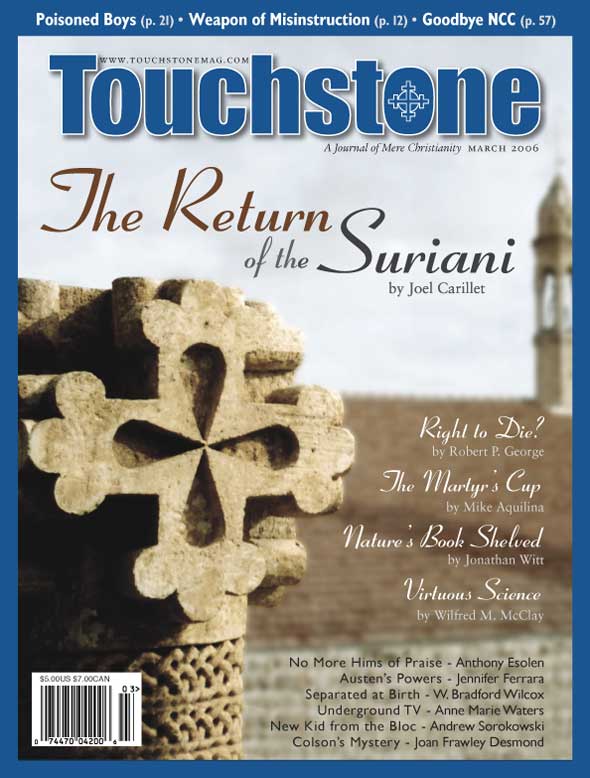Virtuous Science
The Grotesque Immodesty of the Humble Darwinist
There is no gentler and more humane exponent of the full-bore Darwinian understanding of nature than E. O. Wilson. Harvard Magazine published in its November–December 2005 issue a very useful précis of his philosophy, which also serves as an introduction to his latest book, From So Simple a Beginning: The Four Great Books of Charles Darwin.
This enormous volume gathers together Wilson’s preferred editions of what the Magazine’s editors, who are apparently unaware of the irony in their choice of words, refer to as Darwin’s most “iconic” and “foundational” texts. Wilson hopes this megatome will revive interest in reading what Darwin actually wrote. That is a worthy aim, particularly given the careful and fine-grained observation for which Darwin the naturalist will always be rightly celebrated, even if his quintessentially anti-iconic and anti-foundational theories remain a source of controversy.
I had the pleasure of sitting next to Professor Wilson at a dinner-and-discussion in his honor, held in 1998 in the beautiful old library of the Smithsonian “castle” building in Washington, just after the appearance of his book Consilience: The Unity of Knowledge. I was honored to make his acquaintance, and thought him one of the most delightful and sweet-natured gentlemen I’ve ever met.
If one were to take the measure of Darwinian orthodoxy strictly by his genial countenance and patient, humane demeanor, there would be no contest. And I well remember, and honor, the courage and steadfastness he showed earlier in his career, when he was viciously attacked by campus leftists who thought his sociobiological views racist, reactionary, and otherwise unworthy of the protections of academic freedom.
Evolutionary Conquest
That said, though, he was not very persuasive that evening, to me or to anyone else in the room. Nor is he very persuasive in this article, or anyplace else that he has cast his net into waters beyond his areas of unquestioned competence, particularly regarding questions of religion and psychology and history. This attractively modest man seemed to have become consumed with a grotesquely immodest goal. Not only did he seek to unify all knowledge, but he sought to do so in the same way that Alexander unified all the world—by acts of conquest.
Consilience was, in a word, an exercise in raw scientistic reductionism, which proposed to translate all other dimensions of human thought and experience into problems of evolutionary science, and ultimately, into questions of chemistry and physics. Such clumsy intellectual imperialism was too much even for the anti-religious (and pro-Darwinian) philosopher Richard Rorty, also present for the dinner, and Rorty made short work of Wilson in the discussion that day.
But Wilson is a stubborn man, and his anthem remains Science über Alles. In From So Simple a Beginning, he concentrates on an easier target, the pursuit of which is far less likely to attract friendly fire: religion. It need hardly be said that Wilson has nothing good to say about “intelligent design” theory, but he goes much further than that in the Harvard Magazine article. He insists that any effort to achieve rapprochement between science and religion is not only futile, but wholly undesirable.
Why? Because “there is something deep in religious belief that divides people and amplifies societal conflict,” and only a frankly atheistic form of “scientific humanism” is compatible with the way we now live, and capable of providing an “antidote” to the “toxic mix of religion and tribalism.”
One wonders how such an intelligent man could be satisfied with such simplistic bromides. To begin with, one might have thought, he would see that the assertion that religions are uniquely productive of social division might be open to the charge that it is, at best, an example of the logical fallacy post hoc ergo propter hoc, or perhaps a confusion of correlation with causation. One might also think that a man of science (particularly a sociobiologist, who believes in the biological functionality of cultural institutions) might have felt prompted to provide some empirical evidence for such an assertion. But no such luck.
More to the point, one might also wonder why, looking at the matter strictly as a scientist, Wilson would be closed to a strictly functionalist understanding of the role of religion. Why couldn’t a sociobiologist simply prescind from addressing religion’s truth claims, and see religious faith as a deeply rooted adaptive structure that is itself a fruit of evolutionary processes, and hence not to be tossed overboard by mere reasoning?
Naturalism’s Captive
But no, Wilson is held captive to the pure gospel of liberatory scientific naturalism, even if he contradicts himself by claiming for science a standpoint of unconditioned freedom that would make it exempt from the determinism to which it otherwise condemns the rest of reality.
Wilson grudgingly concedes that the historical religions may have had some useful effects in giving rise to ideals of altruism and generosity, and even asserts that their creation myths were “the beginning of science.” But the price for religion has now become too high, in his view, and the benefits too few. “Can scientific humanism do as well or better, at a lower cost?” he asks.
You would expect to hear a ringing endorsement of scientific humanism next. Instead, to his great credit, Wilson says this: “Surely that ranks as one of the great unanswered questions of philosophy.” One is inclined to agree. We have accumulated several thousand years of human history, telling us a great deal about the faults and failings of religions. But we have very little history, or other empirical data, that can tell us what a world ruled by science will look like.
And make no mistake, a world ruled by science is what Wilson has in mind. There will be no allowances made for the idea that there might be “non-overlapping magisteria” of science and faith, as posited by the Harvard paleontologist Stephen Jay Gould, and no social space reserved for religion, except as a harmless diversion or personal hobby.
Shouldn’t he have something more solid to offer us in religion’s place? Particularly if he expects the human race to sacrifice its chief sources of cohesion, of laws and mores, of altruistic behaviors, of rites lending solemnity to the passages of life, of comfort to the anxious and afflicted and dying and grieving, of social identity and purpose—in short, to cut itself off from the chief source of its entire civilized past? That is a lot to ask, for the sake of an “unanswered question.” I’m not sure it even makes sociobiological sense, let alone any other kind.
And actually we do have some evidence of what rule by science might look like, in the Communist societies of the last century. But Wilson formulates the alternatives facing us in a way that serves to obscure that evidence. He offers his own “scientific humanism” as the alternative to two Great Fallacies: the dogmas of God-centered religion, and “blank-slate” atheistic communism. The latter, of course, is an example of a regime that consciously based itself on a scientific and post-religious worldview, so its pernicious effects have to be explained away as strictly a matter of being based on rule by “bad science” rather than by science per se.
Materialism’s Failure
Wilson has thus devised a very idiosyncratic and self-serving way to divide up the history of ideas. One might have thought that Marxism-Leninism’s scientific materialism and Wilson’s scientific materialism are more alike than different—two variations on the same theme. But Wilson insists that they are radically different, distinguishing them by the fact of Marxism-Leninism’s acceptance of a tabula rasa and constructivist view of human nature, while the Wilsonian materialist holds the sociobiological view that we have a fully wired human nature, albeit one that has been “self-assembled” through millions of years of natural selection.
But this differentiation, while it helps Wilson separate himself from some admittedly nasty company, does not really go to the heart of what theists and others find lacking in any strictly materialist view of nature. The materialist cannot provide an account of the proper ends of things, or explain how, in the complete absence of the great religious traditions, one is to find plausible grounds for a widely accepted belief in the dignity of the human person, grounds that are sturdy enough to resist the growing instrumentalization of human life, and the frighteningly post-human prospects that science—not religion—has now brought within our reach.
There’s not a great deal of difference between the two scientific materialisms in this respect. Neither has a useful word to say in answer to the questions, “How shall I order my life? And for the sake of what ends shall I live it?” Neither can give us a morally compelling argument against, for example, creating a race of human-like beings whose sole reason for existence is as an inexhaustible supply of spare parts for the rest of us. Or against abolishing procreation entirely, in favor of hatcheries in which life-unworthy-of-life will be selected out like so many weeds, and constant eugenic enhancements will steadily transform the species.
Science, by its very nature, tells us almost nothing about how to use rightly the powers it places in our hands. Indeed, the question as to whether science can provide us with such moral guidance, in and of itself, is not really as unanswered as Wilson implies.
Let it be clear that the criticisms here are directed against Wilson’s philosophy, not his science. But it should also be said that his sweeping dismissal of any challenges to the regnant dogmas, and his effort to promote ever more rigidly scientistic ones, is itself contrary to the underlying ethos of science—and dismally representative of the astoundingly high-handed and illiberal behavior of the more vocal public spokesmen for science, such as the popular science writer Richard Dawkins and the fantasy novelist Philip Pullman.
Darwinian Bullies
Listening to him, and to more aggressive and bullying keepers of the Darwinian flame who consistently insult or silence their challengers rather than answer them with patient and rational argument, one could almost forget that the authentic spirit of working science is something entirely different.
It is careful, provisional, tentative, modest, and process-oriented, always open to refutation, grounded in a disciplined asceticism that sticks to the experimental evidence at hand. It does not claim to know what it cannot know, and is slow to draw conclusions. Yet it combines such interpretive humility with a deep sense of wonder at the beauty and variousness and intricacy and orderliness of the world we inhabit, and a desire to draw closer to it. It has a disinterested passion for knowledge. It is a thoroughly admirable disposition.
One can see some of these admirable qualities in Darwin himself, whose views on matters of religion were far more fluid and ambiguous than Wilson seems to believe. I have had the privilege to know many scientists whose outlook fits this description perfectly, and I wish it were possible for the public to hear from some of them, rather than the professional controversialists, some of whom are more notable for their media savvy than for their scientific achievements.
We most emphatically do not need a new round in the “warfare between science and religion,” even if a man as otherwise distinguished as E. O. Wilson seems to want to force it upon us. Such warfare distorts the work of both science and religion, and disserves us all.
Wilfred M. McClay, for the editors
For Wilson’s Harvard Magazine précis, see www.harvardmagazine.com/on-line/110518.html.
Wilfred M. McClay holds the SunTrust Chair of Humanities at the University of Tennessee at Chattanooga, and is the author of The Masterless: Self and Society in Modern America (North Carolina) and A Student's Guide to U.S. History (ISI Books). He is a member of the Presbyterian Church, U.S.A.
subscription options
Order
Print/Online Subscription

Get six issues (one year) of Touchstone PLUS full online access including pdf downloads for only $39.95. That's only $3.34 per month!
Order
Online Only
Subscription

Get a one-year full-access subscription to the Touchstone online archives for only $19.95. That's only $1.66 per month!
bulk subscriptions
Order Touchstone subscriptions in bulk and save $10 per sub! Each subscription includes 6 issues of Touchstone plus full online access to touchstonemag.com—including archives, videos, and pdf downloads of recent issues for only $29.95 each! Great for churches or study groups.
Transactions will be processed on a secure server.
more on science from the online archives
more from the online archives

14.6—July/August 2001
The Transformed Relics of the Fall
on the Fulfillment of History in Christ by Patrick Henry Reardon
calling all readers
Please Donate
"There are magazines worth reading but few worth saving . . . Touchstone is just such a magazine."
—Alice von Hildebrand
"Here we do not concede one square millimeter of territory to falsehood, folly, contemporary sentimentality, or fashion. We speak the truth, and let God be our judge. . . . Touchstone is the one committedly Christian conservative journal."
—Anthony Esolen, Touchstone senior editor











